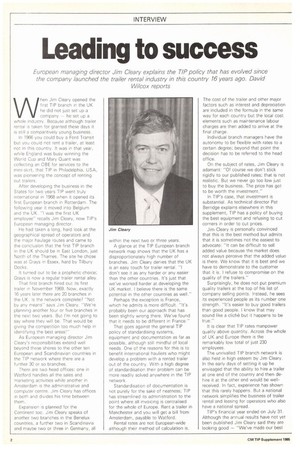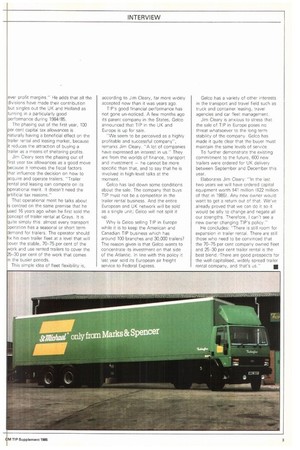Leading to success
Page 120

Page 121

If you've noticed an error in this article please click here to report it so we can fix it.
European managing director Jim Cleary explains the TIP policy that has evolved since the company launched the trailer rental industry in this country 16 years ago. David Wilcox reports
When Jim Cleary opened the first TIP branch In the UK he did not just set up a company — he set up a whole industry. Because although trailer rental is taken for granted these days it is still a comparitively young business.
In 1966 you could buy a Ford Transit but you could not rent a trailer, at least not in this country. It was in that year, while England was busy winning the World Cup and Mary Ouant was collecting an OBE for services to the mini-skirt, that TIP in Philadelphia, USA, was pioneering the concept of renting out trailers.
After developing the business in the States for two years TIP went truly international in 1968 when it opened its first European branch in Rotterdam. The following year it moved into Belgium and the UK. "I was the first UK employee" recalls Jim Cleary, now TIP's European managing director.
He had taken a long, hard look at the geographical spread of operators and the major haulage routes and came to the conclusion that the first TIP branch in the UK should be in East London, just North of the Thames. The site he chose was at Grays in Essex, hard by Tilbury Docks.
It turned out to be a prophetic choice; Grays is now a regular trailer rental alley.
That first branch hired out its first trailer in November 1969. Now, exactly 16 years later there are 20 branches in the UK. Is the network complete? "Not by any means" says Jim Cleary. "We're planning another four or five branches in the next two years. But I'm not going to say where they will be. That would be giving the competition too much help in identifying the best areas!"
As European managing director Jim Cleary's responsibilities extend well beyond these shores to the other ten European and Scandinavian countries in the TIP network where there are a further 30 or so branches.
There are two head offices: one in Watford handles all the sales and marketing activities while another in Amsterdam is the administrative and computer centre. Jim Cleary has offices In both and divides his time between them.
Expansion is planned for the Continent too. Jim Cleary speaks of another two branches in the Benelux countries, a further two in Scandinavia and maybe two or three in Germany, all
within the next two or three years.
A glance at the TIP European branch network map shows that the UK has a disproportionately high number of branches. Jim Cleary denies that the UK is an easy touch for trailer rental. "I don't see it as any harder or any easier than the other countries. It's just that we've worked harder at developing the UK market. I believe there is the same potential in the other countries as well."
Perhaps the exception is France, which he admits is more difficult. "It's probably been our approach that has been slightly wrong there. We've found that it needs to be different in France."
That goes against the general TIP policy of standardising systems, equipment and documentation as far as possible, although still mindful of local needs. One of the reasons for this is to benefit international hauliers who might develop a problem with a rented trailer out of the country. With a high degree of standardisation their problem can be more readily solved anywhere in the TIP network.
Standardisation of documentation is not purely for the sake of neatness; TIP has streamlined its administration to the point where all invoicing is centralised for the whole of Europe. Rent a trailer in Manchester and you will get a bill from Amsterdam, payable to Watford.
Rental rates are not European-wide although their method of calculation is. The cost of the trailer and other major factors such as interest and depreciation are included in the formula in the same way for each country but the local cost elements such as maintenance labour charges are then added to arrive at the final charge.
Individual branch managers have the autonomy to be flexible with rates to a certain degree; beyond that point the decision has to be referred to the head office.
On the subject of rates, Jim Cleary is adamant: "Of course we don't stick rigidly to our published rates; that is not realistic. But we never go too low just to buy the business. The price has got to be worth the investment."
In TIP's case, that investment is substantial. As technical director Pat Berridge explains elsewhere in this supplement, TIP has a policy of buying the best equipment and refusing to cut corners in order to cut prices.
Jim Cleary is personally convinced that this is the best method but admits that it is sometimes not the easiest to advocate; "it can be difficult to sell added value because the market does not always perceive that the added value is there. We know that it is best and we have to demonstrate to the customer that it is. I refuse to compromise on the quality of the trailers."
Surprisingly, he does not put premium quality trailers at the top of his list of company selling points. Instead, he sees its experienced people as its number one strength. "It's easier to buy good trailers than good people. I know that may sound like a cliché but it happens to be true."
It is clear that TIP rates manpower quality above quantity. Across the whole of UK and Europe there is the remarkably low total of just 230 employees.
The unrivalled TIP branch network is also held in high esteem by Jim Cleary. In the early days of setting it up he envisaged that the ability to hire a trailer at one end of the country and then dehire it at the other end would be wellreceived. In fact, experience has shown that this rarely happens. But a national network simplifies the business of trailer rental and leasing for operators who also have a national spread.
TIP's financial year ended on July 31, Although the annual results have not yet been published Jim Cleary said they are looking good — "We've made our best
ever profit margins." He adds that all the divisions have made their contribution but singles out the UK and Holland as turning in a particularly good performance during 1984/85.
The phasing out of the first year, 100 per cent capital tax allowances is naturally having a beneficial effect on the trailer rental and leasing market, because it reduces the attraction of buying a railer as a means of sheltering profits.
Jim Cleary sees the phasing out of irst year tax allowances as a good move because it removes the fiscal factors hat influence the decision on how to scquire and operate trailers. "Trailer ental and leasing can compete on its operational merit. It doesn't need the srtificial tax reasons."
That operational merit he talks about s centred on the same premise that he sed 16 years ago when he first sold the oncept of trailer rental at Grays. It is ouite simply this: almost every transport • peration has a seasonal or short term • emand for trailers. The operator should ix his own trailer fleet at a level that will over the stable, 70-75 per cent of the work and use rented trailers to cover the 25-30 per cent of the work that comes n the busier periods.
This simple idea of fleet flexibility is, according to Jim Cleary, far more widely accepted now than it was years ago, TIP's good financial performance has not gone un-noticed. A few months ago its parent company in the States, Gelco announced that TIP in the UK and Europe is up for sale.
"We seem to be perceived as a highly profitable and successful company", remarks Jim Cleary, "A lot of companies have expressed an interest in us." They are from the worlds of finance, transport and investment he cannot be more specific than that, and to say that he is involved in high-level talks at the moment.
Gelco has laid down some conditions about the sale. The company that buys TIP must not be a competitor in the trailer rental business. And the entire European and UK network will be sold as a single unit; Gelco will not split it up.
Why is Gelco selling TIP in Europe while it is to keep the American and Canadian TIP business which has around 100 branches and 30,000 trailers? The reason given is that Gelco wants to concentrate its investment on that side of the Atlantic. In line with this policy it last year sold its European air freight service to Federal Express. Gelco has a variety of other interests in the transport and travel field such as truck and container leasing, travel agencies and car fleet management.
Jim Cleary is anxious to stress that the sale of TIP in Europe poses no threat whatsoever to the long-term stability of the company. Gelco has made it quite clear that the buyer must maintain the same levels of service.
To further demonstrate the existing commitment to the future, 600 new trailers were ordered for UK delivery between September and December this year.
Elaborates Jim Cleary: -In the last two years we will have ordered capital equipment worth $41 million ($22 million of that in 1985). Any new owner would want to get a return out of that. We've already proved that we can do it so it would be silly to change and negate all our strengths. Therefore, I can't see a new owner changing TIP's policy."
He concludes: "There is still room for expansion in trailer rental. There are still those who need to be convinced that the 70-75 per cent company owned fleet and 25-30 per cent trailer rental is the best blend. 'There are good prospects for the well-capitalised, widely spread trailer
rental company, and that's us." •












































































































































